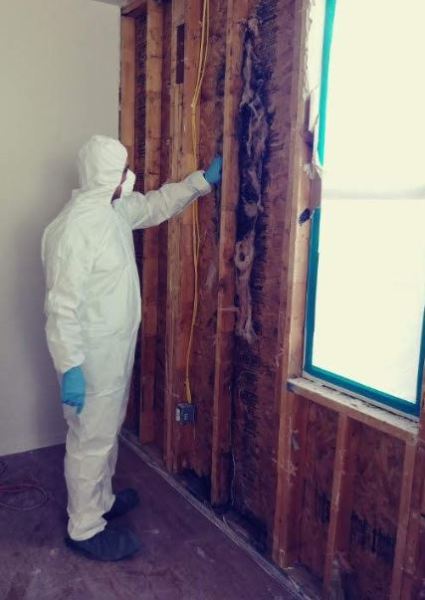

Nine military families are suing their Fort Hood housing provider, alleging that they were subjected to “pervasive mold and other airborne toxins” which impacted their health while their landlords sat by and did nothing.
The lawsuit targets Fort Hood Family Housing, which is run by Lendlease. The company manages over 5,000 homes at Fort Hood, and was also one of six that, in a survey last spring, failed to receive average satisfaction rates “at or above neutral” from tenants.
“Despite clear evidence of dangerous mold and its catastrophic health consequences, Defendants refuse to admit the truth regarding the severity of the problems in the housing for which they are responsible,” the lawsuit states. “Defendants refuse to remedy the underlying conditions that cause mold in the houses they lease to service members, instead moving them to hotels or temporary ‘hospitality suites’ with just as many problems, all the while assuring service members the temporary lodgings are just fine.”
Among the families named in the lawsuit is Sgt. 1st Class Jesus Joseph Brown, who has over 20 years of service and three deployments under his belt. He moved to Fort Hood with his wife Emilee and their two sons in March 2018.
Within a year and a half, the Browns lived in three houses on Fort Hood, moving from one to the other because of “problems so severe they feared for their health.”

According to the complaint, the Browns were repeatedly placed in housing contaminated with mold. The family reportedly experienced headaches, nausea, brain fog, labored breathing, joint pain, and more.
A medical test of each of the family members after the Browns moved off post “showed the presence of a family of mycotoxins that cause skin inflammation, vomiting, acute lung and nasal problems, lung disorders, brain dysfunction, and bone marrow dysfunction.”
It took a psychological toll as well — the Browns’ youngest son “complained to his teachers and therapist of a fear of mold.” Per the complaint, he wrote a paper in school expressing “concern that mold was going to kill everyone in his family.”
In another home, Sgt. Jason Kiernan — who has served 12 years in the Marine Corps plus two years so far in the Army and has deployed three times to Iraq and Afghanistan — and his wife, Sarah, experienced many of the same issues.
Sarah Kiernan told Task & Purpose that the two had “never had any prior issues” with any other on-base homes that they’d occupied during her husband’s military career.
The complaint explains that Sarah was pregnant with the couple’s third child, and while living in an on-post home at Fort Hood, she “experienced difficulties and issues with her third child that she never experienced with her first two.”
In February 2019, Sarah went to the hospital out of concern that something was wrong with her unborn son. The doctors conducted an emergency C-section, and the baby has since had “an ongoing struggle with severe asthma and chronic respiratory illnesses” which the Kiernan’s say is due to the mold in their home.
“At three months old, the baby nearly lost his life and now suffers from chronic asthma and impaired lung function, which will continue for not only his entire childhood, but potentially the rest of his life,” the lawsuit states.

A few months later, another of the Kiernan’s sons was playing in his room when he “fell through a wet, soggy bedroom wall, revealing large amounts of mold.”
In May, an inspector came to assess the Kiernan’s home for mold, explaining they wouldn’t have results back for a few days. But later the same day, the complaint says, the inspector “called the Kiernans crying and warned them that [their home], given the youngest Kiernan’s severe condition, was the ‘hardest’ mold-contaminated case she had encountered on Fort Hood.”
And so the stories go — one after the other, detailing horrors that service members and their families say they experienced in their homes at Fort Hood.
One family saw a “massive fire ant infestation” in their backyard, which resulted in one of their sons getting “extensive ant bites.”
Two soldiers’ wives starting losing hair.
Another family was placed “in temporary lodging furnished with blood-stained mattresses” after complaining of mold in their home.
A soldier reportedly discovered mold growth on his dress blues. His wife’s allergies got so bad that she had to take steroids, which “ultimately caused her to miscarry,” per the complaint.
The allegations range from shoddy “patchwork” maintenance of countertops and fencing, to painting over mold, and using “deceptive practices” like having a family’s 19-year-old son sign off on work orders.
But what the families say they’ve experienced is, unfortunately, nothing out of the ordinary. For years, service members have complained of mold, rodent infestations, cheap repair jobs, and inaction from both their housing providers and the military.
In November, 10 families filed a lawsuit against another housing provider, Corvias, for subjecting them to “appalling housing conditions” at Fort Meade in Maryland.
Housing company executives were grilled by lawmakers earlier this year in a hearing that heard from both executives and tenants. Rep. Debbie Wasserman Schultz (D-Fla.), Chairwoman of the Military Construction, Veterans Affairs, and Related Agencies Subcommittee, honed in on the privatized housing contracts with the Defense Department, calling them a “gravy train” for the companies that put “millions and millions of dollars” into the executives’ pockets without giving families a way to “hold you accountable.”
Sarah Kiernan described her experience with Lendlease at Fort Hood as a nightmare; in her eyes, the management is intentionally deceptive, grossly negligent, and shouldn’t be allowed “any business dealings with military families.”
“This is so wrong,” she said of Lendlease. “It makes me so angry, it makes me so mad … I just feel like there is not a pit in hell deep enough that I would like to see them burn in.”
